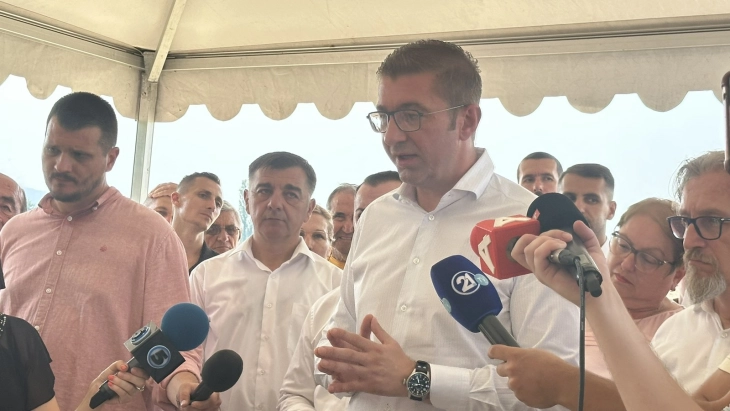Mickoski: Up to courts, not politicians to judge whether treaties or human rights are violated
- The Hague International Court of Justice decides on whether the Prespa Agreement has been violated, and the European Court of Human Rights in Strasbourg decides on any violations of human rights, said Prime Minister Hristijan Mickoski commenting on Greek PM Kyriakos Mitsotakis recently saying Greece was supervising the EU path of the country and on Bulgaria's request for constitutional changes as a prerequisite for continuing talks with the EU.
- Post By Magdalena Reed
- 17:55, 20 July, 2024

Skopje, 20 July 2024 (MIA) — The Hague International Court of Justice decides on whether the Prespa Agreement has been violated, and the European Court of Human Rights in Strasbourg decides on any violations of human rights, said Prime Minister Hristijan Mickoski commenting on Greek PM Kyriakos Mitsotakis recently saying Greece was supervising the EU path of the country and on Bulgaria's request for constitutional changes as a prerequisite for continuing talks with the EU.
Asked about Mitsotakis, Mickoski said the Greek PM had missed two chances to meet with him at the NATO Summit in Washington, where they could have "crossed arguments."
Commenting on the Greek PM's recent statement that Greece was the "supervisor" of Skopje's European path and that the country cannot move toward Europe unless the name issue is resolved through the government clearly stating that the new name applies to everyone, Mickoski said it was not up to politicians but up to the ICJ to say if the Prespa Agreement had been violated.
"Sorry, but not only do I not resort to threats and ultimatums in the 21st century but also I reject them and I am amazed at the suggestion that politicians presenting themselves as European politicians could issue this type of threats and ultimatums. I hope that Mr. Mitsotakis did not say that," Mickoski told the press following a foundation stone laying ceremony for a child care center in Trubarevo.
Mickoski is ready, he said, to meet with his Greek counterpart and "sit down and see what Macedonia has done and what Greece has done."
"But I would like to leave the past behind us and look to the future because our citizens expect a future from us and good neighborly relations are in our future. As a government, we want to build good neighborly relations with all neighbors, literally everyone. But this is a two-way street," Mickoski said, adding that people needed to get used to different politics and that there were no "spineless" politicians in the new government.
On Bulgarian PM Rumen Radev, Mickoski said they had a "perfunctory meeting" on the sidelines of the European Political Community summit in the UK.
He said they had exchanged only a few sentences on the "need to sit down and agree on a sustainable solution" on how to regionally present the two states to third countries, following the example of the Baltics.
Mickoski said given the political situation in Bulgaria, he thought "there is no energy from their side for dialogue."
On the topic of human rights violations, Mickoski said there were 14 European Court of Human Rights judgments against Bulgaria for violating Macedonians' human rights in Bulgaria.
"And zero [judgments] against Macedonia violating the rights of citizens who belong to the Bulgarian community. So the question arises: Why is this [constitutional] change necessary?", Mickoski said.
On the new government's position that the country would adopt the constitutional changes with a delayed enforcement, which would guarantee that Bulgaria does not set any more new conditions for EU membership, Mickoski said this was part of VMRO-DPMNE's election platform and "a proactive solution, considering that we want to be in the EU."
He reiterated that the enforcement of the constitutional amendments would be delayed until the end of the negotiations and the ratification of the preaccession protocol in national parliaments because otherwise "no one is giving us a guarantee that this would be their last condition."
"We have to preserve what little dignity we have left," Mickoski said, adding that the country had made concessions "like no other European nation," including changing its flag, coat of arms, banknotes, the Constitution, and its name.
"Anything we could change to humiliate ourselves as a nation, we did. I don't know what else remains for us to do to humiliate ourselves as a nation. And always, without exception, we were told, 'Just one more thing' and it would be the last. But somehow, there was always something else. It was never the last thing," Mickoski said. mr/







